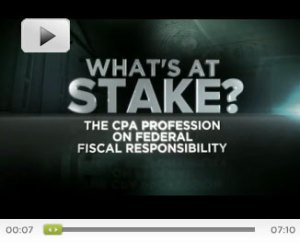This is the archive of CPA Now blogs posted on the PICPA website through April 30, 2025. Want more recent blogs?
President Misses the Mark on Inversion Blame
In President Obama’s press conference on Aug. 7, 2014, he blamed the wave of corporate inversions to escape the 35 percent statutory corporate federal tax rate on accountants. The president’s statement is off the mark. It was Congress, not accountants, that enacted the incredibly complex international tax regime in the first place.
Aug 15, 2014, 13:15 PM
By Guest Blogger Ed Jenkins Jr., CPA
 In President Obama’s press conference on Aug. 7, 2014, he blamed the wave of corporate inversions to escape the 35 percent statutory corporate federal tax rate on “accountants going to some big corporations… and saying we found a great loophole.” The President’s statement is off the mark. It was Congress, not accountants, that enacted the incredibly complex international tax regime in the first place. In addition, as The Wall Street Journal “Lawyers and Firms” blog reported on Aug. 5, 2014, the genesis of the promotion of inversions was a 2010 bicycle ride through Europe during which attorneys from Skadden Arps cooked up the scheme. So, it seems, attorneys have a good bit more responsibility than do accountants.
In President Obama’s press conference on Aug. 7, 2014, he blamed the wave of corporate inversions to escape the 35 percent statutory corporate federal tax rate on “accountants going to some big corporations… and saying we found a great loophole.” The President’s statement is off the mark. It was Congress, not accountants, that enacted the incredibly complex international tax regime in the first place. In addition, as The Wall Street Journal “Lawyers and Firms” blog reported on Aug. 5, 2014, the genesis of the promotion of inversions was a 2010 bicycle ride through Europe during which attorneys from Skadden Arps cooked up the scheme. So, it seems, attorneys have a good bit more responsibility than do accountants.Likewise, instead of attacking accountants, the President should keep in mind that no one is promoting anything that is illegal or that is not in the best interest of shareholders. Keep in mind the underlying “Agency Theory” of corporations. Shareholders own the corporation, shareholders elect a board of directors to represent their interests, and the board of directors hires officers to act as agents for the corporation. So, management and the board of directors have a duty to shareholders to maximize the value of the stock. If a significant expense can legally be reduced, management and the board are obligated to investigate the opportunity to cut cost and increase shareholder value. Some shareholders feel so strongly about that obligation that lawsuits compelling management to consider inversions are being considered. Hopefully those shareholders are being careful enough to note they may have to recognize gain on the transaction; without the benefit of the cash to pay the tax.
Instead of casting aspersions, perhaps the President could work with Congress to change the law, if that’s what he and Congress collectively think is best for the country. A serious review of the U.S. tax code is long overdue. That review, however, cannot be done in a vacuum. It must contemplate the tax base erosion and profit shifting projects at the Organisation for Economic Co-operation and Development and IRS, and it better address the astronomical federal debt. Before the President and Congress rush to lower the tax rate on corporations here in the United States to be more competitive with Europe, they should makes sure that the U.S. can afford the changes that will be necessary with respect to individual taxation. Keep in mind, while European corporations may enjoy a lower tax rate, individuals generally have to pay higher individual taxes on income and employment as well as a value added tax, or VAT.
 I would also recommend a review of the AICPA’s “What’s at Stake? The CPA Profession on Federal Fiscal Responsibility” resources. Those resources provide general guidance on how to read the financial statements of the U.S. government for insight into the nation’s fiscal health; particularly as those materials explain the effect of the staggering level of federal debt.
I would also recommend a review of the AICPA’s “What’s at Stake? The CPA Profession on Federal Fiscal Responsibility” resources. Those resources provide general guidance on how to read the financial statements of the U.S. government for insight into the nation’s fiscal health; particularly as those materials explain the effect of the staggering level of federal debt.Ed Jenkins Jr., CPA, is an instructor of accounting at Pennsylvania State University in University State Park. He can be reached at erj2@psu.edu.

